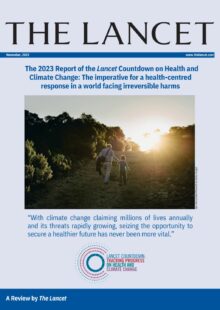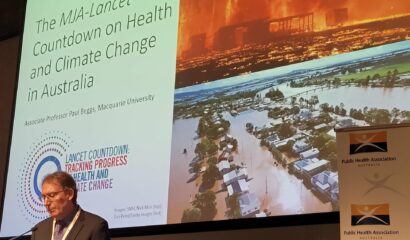Need all the details? Download the full report
The full report is available free of charge via The Lancet.
Download hereThe latest Lancet Countdown report underscores the imperative for a health-centred response in a world facing irreversible harms.
Climate inaction is costing lives and livelihoods today, with new global projections revealing the grave and mounting threat to health of further delayed action on climate change. But bold climate action could offer a lifeline for health.
This year’s report launches just weeks before the COP28 which has a health focus for the first time. The findings underscore the opportunity of a lifetime that COP could help deliver – through commitments and action to accelerate a just transition. Without profound and swift mitigation to tackle the root causes of climate change and to support adaptation efforts, the health of humanity is at grave risk.
Our 2023 Report tracks the relationship between health and climate change across five key domains and 47 indicators, providing the most up-to-date assessment of the links between health and climate change.
Explore the interactive summary of the key findings here
Need all the details? Download the full report
Need all the details? Download the full report
The full report is available free of charge via The Lancet.
Download here
Climate inaction is costing lives and livelihoods today, and projections reveal future dangers ahead
At 1.14ºC of global heating, the risks of climate change are rapidly growing, costing lives and livelihoods worldwide, today. Health systems are increasingly strained, and failure to support equitable adaptation has left populations are unprotected in the face of the increased climate hazards. Those who contributed the least to global emissions are being hit hardest.
But this could be just a glimpse into an increasingly dangerous future, with all risks projected to soar even in a world of 2ºC of heating. Tackling greenhouse gas emissions, and ensuring climate-related health hazards don’t exceed the capacity of health-supportive systems to adapt, is a health imperative.
The world is moving in the wrong direction
Each tonne of greenhouse gases emitted makes adaptation increasingly challenging and costly and worsens the health risks that people will face for decades to come. Yet, fossil fuel companies, private banks and corporations continue to promote fossil fuel burning, putting a healthy future further out of reach. Since last year, fossil fuel investments grew, and oil and gas giants further expanded their activities. Since the Paris Agreement was signed, private banks increased their lending to fossil fuel companies.
Meanwhile, the most vulnerable communities are being left behind in the zero-carbon transition, remain reliant on air-polluting fuels, and exposed to the health harms of energy poverty.
There are transformative opportunities for a healthy, prosperous future for all
Health-centred climate action could still save millions of lives every year. A just and equitable transition away from fossil fuels and towards renewable energy and energy efficiency can reduce the health harms of energy poverty, power high-quality health-supportive services, and prevent the millions of deaths occurring annually from exposure to fuel-derived air pollution. Greener, people-centred cities, and balanced, low-carbon diets can support transformative improvements in physical and mental health.
In delivering such ambition, people and their health must be kept at the centre of all policies. Transformative climate action is needed today to enable a future where present and future generations can thrive.
Explore key findings of this year’s report
Health Hazards, Exposures, and Impacts
Climate Change Impacts, Exposure and Vulnerability
A changing climate has profound implications for human health, with more frequent heatwaves and extreme weather events, changing patterns of infectious disease, and the exacerbation of existing health challenges around the world. Indicators in this section track how these impact on human health.
Adaptation, Planning, and Resilience for Health
Adaptation, Planning, and Resilience for Health
Indicators in this section track how communities, health systems, and governments are understanding the health risks of climate change, the strategies and resources they are deploying, and how adaptation and resilience measures are being implemented globally.
Mitigation Actions and Health Co-Benefits
THE HEALTH BENEFITS OF THE RESPONSE TO CLIMATE CHANGE
Tackling climate change could be the greatest global health opportunity of the 21st century. Many of the interventions required to mitigate and adapt bring enormous benefits for human health and wellbeing in the form of cleaner air, healthier diets, and more liveable cities. Indicators in this section track the world’s efforts to mitigate climate change, and the health benefits of this response.
Economics and Finance
Economics and Finance
The data here works to track the financial and economic dimensions of the effects of climate change, and of mitigation efforts required to respond to these changes. Indicators here monitor the economic costs of climate change and its drivers, as well as the investments and economic tools being deployed to transition to a low-carbon economy.
Public and Political Engagement in Health and Climate Change
Public and Political Engagement in Health and Climate Change
Public and political engagement underpins the foundations of the world’s collective response to climate change, with reductions in global emissions at the speed required by the Paris Agreement depending on engagement from all sectors of society. The indicators in this section track the links between health and climate change in the media, national governments, the corporate sector, and the broader public.
1.1.5 Heat-Related Mortality
In 2018-2022, people experienced on average 86 days of health-threatening high temperatures annually. 60% of such temperatures were made more than twice as likely to occur by human-caused climate change.
1.3.1 Dengue
The transmission potential for dengue by Aedes aegypti and albopictus increased by 42.7% and 39.5%, respectively.
1.4 Food Security and Undernutrition
The higher frequency of heatwave days and drought months in 2021 compared to 1981–2010, is associated with 127 million more people experiencing moderate or severe food insecurity.
2.1.3 City-Level Climate Change Risk Assessments
In 2022, 94% of cities (848/898) reported they had completed or were undertaking a city-level climate change risk assessment, up from 713 in 2021.
2.2.2 Air Conditioning: Benefits and Harms
In 2021, air-conditioning provided cooling in a third of households but consumed about 1900 terawatt hours (TWh) of electricity (approximately the total electricity consumption of India and Brazil combined).
2.3.1 Vulnerability to Mosquito-borne Disease
Low HDI countries experienced a 37% decrease in vulnerability to Aedes-borne disease between 1990 and 2021, partly due to improvements in access to healthcare.
3.2.1 Mortality from Ambient Air Pollution
Global deaths attributable to fossil fuel-derived PM2.5 decreased from 1.4 million in 2005 to 1.2 million in 2020. Reduced coal pollution contributed to about 80% of the decrease.
3.2.2 Household Air Pollution
The use of polluting fuels resulted in 140 deaths per 100,000 associated with household air pollution in 2020 in 62 countries reviewed, 56% of which was due to the use of solid fuels.
3.3.2 Diet and Health Co-Benefits
In 2020, 7.8 million deaths were associated with insufficient consumption of nutritious plant-based foods, and 1.9 million to excessive consumption of dairy, red and processed meat.
4.1.1 Economic Losses due to Weather-related Extreme Events
Global economic losses due to weather-related extreme events were US$264 billion in 2022. While 57.1% of losses in very high HDI countries were insured, 92.8% of losses in other countries were uninsured.
4.2.6 Compatibility of Fossil Fuel Company Strategies With the Paris Agreement
The strategies of the 20 largest oil and gas companies as of February 2023 would lead to production exceeding levels consistent with 1.5°C of heating by 173% in 2040, an increase from 112% expected as from February 2022.
4.2.7 Fossil Fuel and Green Bank Lending
Green sector lending has risen sharply since 2016, to US$498 billion in 2021, and is approaching fossil fuel lending. However, 22 of the top 40 private banks have increased their fossil fuel lending.
5.3.2 Scientific Engagement on the Health Impacts of Climate Change
There are global inequalities in the location of studies referring to the health impacts of human-influenced climate drivers: 6.89 studies per million people in very high HDI countries, and 1.61 and 1.51, respectively, for medium and low HDI countries. Of 37 extreme events analysed for detection and attribution between 2022 and 2023, 31 (84%) were more likely and/or more severe because of climate change.
5.4.2 Engagement by International Organisations
Tweets mentioning the health co-benefits of climate change action reached a record of 22% of all monthly tweets from International Organisations in November 2022, in a continuously upward trend.

VACANCY: Join the Lancet Countdown Academic Leadership Team!
The Lancet Countdown is seeking to appoint five new Working Group Chairs and five new Working Group Co-Chairs to steer its academic activities.
Read more
Lancet Countdown Oceania centre receives public health award
The 2023 Public Health Association of Australia (PHAA) Tony McMichael Public Health Ecology and Environment Award recognises the Lancet Countdown Oceania's work.
Read more
Request for Proposals: Lancet Countdown website redesign
The Lancet Countdown is looking to redesign and launch a new-look website. We are welcoming proposals until 28 April 2023.
Read more
We’re growing our collaboration in Africa!
Are you an expert on climate change and health in Africa who may be interested in joining the Lancet Countdown collaboration? Or do you know someone who is?
Read more